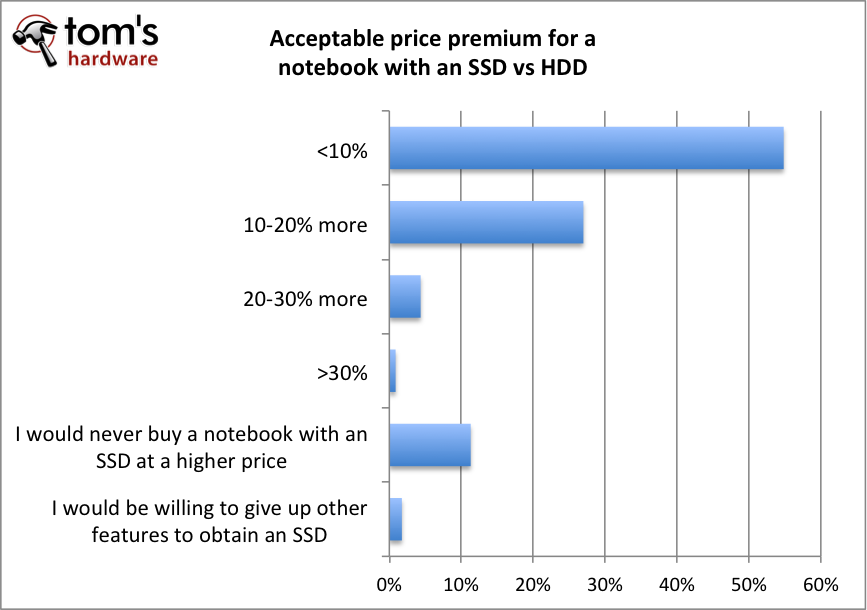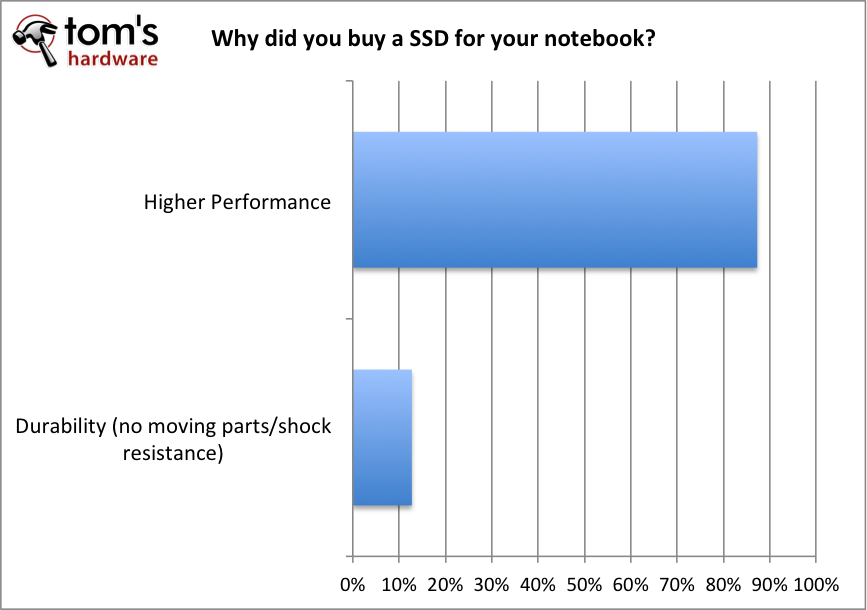2011 Flash Memory Summit Recap: Tom's Hardware Represents
Jumping On The SSD Bandwagon
Many manufacturers don't seem to give their customers much credit. There's this idea that all we need is more education, and once everyone understands the benefits of SSD caching, hybrid drives, and standalone SSDs, they'll be more willing to embrace the higher cost of solid-state storage.
We don't necessarily agree. You don't have to be an enthusiast to know that SSDs offer a significantly different experience than hard drives. The New York Times recently interviewed our editor-in-chief Chris Angelini for a story on solid-state storage. Assuredly, this is not a fringe technology misunderstood by the mainstream.
The issue, really, is cost. As many of our readers pointed out in a recent poll, they purposely pick mobile technology with conventional storage. It's not that they aren’t interested in the performance benefits of an SSD. Rather, there's a limit to how much most people are willing to spend on a more responsive storage subsystem. And as you can see in the chart below, very few folks are willing to sacrifice another feature to fit an SSD in a given budget.
This same poll was also conducted back in 2006 by IDC, and the results are largely the same. It’s very clear that most people are only willing to accept a 10% price premium for a notebook with an SSD. A majority of those who don't cap the expenditure at 20%.
When it comes to mobility, most folks seem to agree that durability is a nice benefit. However, it's clearly not the primary motivator behind SSD purchases.
Everyone at the conference seemed to agree that SSDs won’t replace hard drives as a result of the cost factor. The price you pay per gigabyte of solid-state memory is significantly higher than magnetic storage, and may always be. Since that constant isn't expected to change any time soon, we spent some time discussing a few other peripheral issues.
Get Tom's Hardware's best news and in-depth reviews, straight to your inbox.
Current page: Jumping On The SSD Bandwagon
Prev Page SSD Performance: One Cog In The Wheel Next Page SSD Adoption And The Peripheral Issues-
compton Is there a way for a user to record their own week of disk access, and in so doing make their own Storage Bench (with the assistance of some other software)?Reply -
Still very surprised hybrid hard disks like the Momentus XT aren't getting more R&D. If they included even half the capacity of a mainstream HD and a quarter the capacity of a mainstream SSD, they'd have an amazing product. Just think: a 500GB platter paired with 32GB SSD for, what, $150? I'd buy that in a jiffy.Reply
-
chovav caywen - I don't think I agree. This approach means you will lose both SSD and hard drive if one fails. Second, a small SSD like that will only be useful for caching, which we all saw until now isn't worth much.Reply
lastly, wanting to upgrade will mean having to upgrade both, instead of one. I think this is one of the reasons why the XT was never so popular...
O.T - nice read. It did feel a bit as though it was stopped in the middle.. -
mkrijt chovavIt did feel a bit as though it was stopped in the middle..Reply
That was exactly what I was thinking. I was looking for the "next page" button but couldn't find it. I was like wtf? went back to the first page to look at the index finding it really ended there :( -
cknobman mkrijtThat was exactly what I was thinking. I was looking for the "next page" button but couldn't find it. I was like wtf? went back to the first page to look at the index finding it really ended thereReply
LOL me too!!!
For me personally I am willing to drop up to $120 on a SSD but that is the breaking poing for me and I am not willing to settle for anything less than 120GB due to the performance drop in smaller SSD's and also how much space I need for my OS and other apps (and no I am not counting data like movies or pics).
The main thing holding me off on purchasing a SSD right now is the lack of confidence in reliability. The bugs in Intel, Sandforce, and whatever controller crucial uses in the m4 makes me worried. Just looking at articles here and user reviews on NewEgg was enough for me to get gun shy and wait. There are few things I hate more than having to setup my system and even though I can ghost my boot drive there will always be some loss in a drive failure and that is just something I want to avoid if I can. Unfortunately it just seems like owning a SSD right now leaves too high a risk of drive failure. Plus it does not help reading how manufacturers refuse to comment or give any real hard data on reliability. -
nforce4max What about page file related write attributed to normal use? It is very easy to see more than 10gb a day worth of writes depending on the apps used.Reply -
razvanz nforce4max I agree with you. I haven't seen any SSD tests using bittorent. How does a SSD fare against a HDD in bittorent usage. I think bittorent will easily overwhelm the read/write cycles of a SSD.Reply -
JamesAbel On the surveys on "willingless to pay for SSDs" - has this ever been done on someone that has TRIED an SSD? Reading about a benchmark is different than experiencing it. On my SSDs, I see huge benefits in things like app load time vs. an HDD. Also, SSDs are much faster vs. HDDs when multiple apps are running and causing lots of head seeks (drive thrash). Give someone an SSD for a month and then give them back an HDD - I think many won't be so willing to switch back (and be willing to pay from there on out).Reply -
Mark_Alberta I have been testing various SATA SSD's for recording CCTV footage for several months now. The results have been disappointing when compared to mechanical hard drives. First off, unless I set the maximum file size to 85% or less of the drive's capacity, instead of 95% with say, a WD Caviar Black, the drive would over write the data 3-4 times and then suddenly become undetectable on the system until I reboot it. Not a good thing when considering the purpose of the unit. This has occurred on three different manufacturer's drives, so it's obviously not a one-off issue. Another interesting problem that can up was on the 40GB OS drive, the detected volume dropped from 37GB to roughly 24GB. I reformatted the drive, re-installed the OS and everything returned to normal. I am going to continue to try and perfect a system using SSD's, but it is a lot more of a headache that the simplicity of plugging in a 3.5" mechanical drive and moving on.Reply -
drwho1 I would be willing to pay from $150 to @200 top for a 500GB SSD.Reply
When prices and size ratio meet this price standards then I would take a serious look into SSD's.
Have in mind that current 2TB hard drives are under $100 dollars (true they are green drives). But when a SSD per GB cost 10 to 20 times as much a hard drive is just not right to me.

